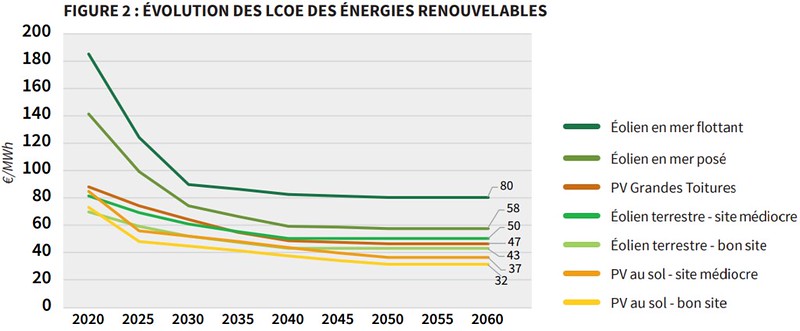 So Twits Jerry Taylor. He is channelling Bloomberg:
So Twits Jerry Taylor. He is channelling Bloomberg:France will save 39 billion euros ($44.5 billion) if it refrains from building 15 new nuclear plants by 2060, and bets instead on renewable energy sources to replace its all its aging atomic facilities, a government agency said. France should spend 1.28 trillion euros over the next four decades, mostly on clean power production and storage capacities, networks, and imports, according to a report from the country’s environment ministry. If it does this, France would progressively shut down its 58 atomic plants and renewable energy would comprise 95 percent of its electricity output by 2060, up from 17 percent last year.The report itself is in Frog, but I am up to the task, unlike the report's authors, who will doubtless soon be receiving a short and brutal visit from the Academie Francaise for use of vulgar Anglo-Saxonisms like LCOE ("levelized cost of electricity") instead of CdEE. As you see, they predict various versions of solar PV getting ever cheaper, although rather suspiciously flattening out towards the end, almost as though they'd kinda given up making half-arsed guesses. Let's say we end up around E50/MWhr.
Compared to this, "Nucléaire historique", if supposed prolonged to 2060, seems to be 42 €/MWh, though as they note not all existing plants could be kept going that long. "Nucléaire de nouvelle génération (EPR)" comes in at 85 €/MWh or perhaps 70 €/MWh, depending on some assumptions I didn't bother read too carefully, since as everyone knows the costs of nukes is generally higher than you think. As for thermal power, they suggest prix de la tonne de CO2 sur le marché européen est supposé égal à 30 € en 2030 et 57 € en 2050. I think that 1 MWhr requires about 600 kg of coal, which if correct means that even if thermal plants were entirely free to operate other than the carbon permits, they wouldn't be viable in 2050 compared to solar.
At that point we're only 8 pages into a 36 page report, but we seem to have got to the result, so there's no point reading on.
Refs
* Results showed that self-report means generally did not differ from informant-report means
Of course the sun always shines when electricity is required.
ReplyDeleteThey probably cover that too - there's definitely some stuff about batteries - but reading French is slow for me so I didn't try to read it all.
ReplyDeleteAs for thermal power, they suggest prix de la tonne de CO2 sur le marché européen est supposé égal à 30 € en 2030 et 57 € en 2050. I think that 1 MWhr requires about 600 kg of coal, which if correct means that even if thermal plants were entirely free to operate other than the carbon permits, they wouldn't be viable in 2050 compared to solar.
ReplyDeleteBit confused by that. Isn't the French there referring to the ETS carbon price per tonne of CO2 emissions (which is currently at €24)? What is the "1 MWhr requires about 600 kg" referring to?
Ah, sorry. You do mean the price of coal after including carbon permit? I initially read it as suggesting the price of coal would be too high even without carbon permits.
ReplyDeleteYes, that's right: I meant that even if the coal (and plant) were free, the carbon price alone would make it too expensive. And was then annoyed that they hadn't supplied the numbers for me to see that directly, so I had to look up the 600 kg per 1 MWhr myself.
ReplyDeleteThis is dumb/ideological; France serves as an example of what to do to combat increasing greenhouse emissions.
ReplyDelete